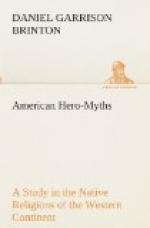The story of the virgin-mother points, in America as it did in the old world, to the notion of the dawn bringing forth the sun. It was one of the commonest myths in both continents, and in a period of human thought when miracles were supposed to be part of the order of things had in it nothing difficult of credence. The Peruvians, for instance, had large establishments where were kept in rigid seclusion the “virgins of the sun.” Did one of these violate her vow of chastity, she and her fellow criminal were at once put to death; but did she claim that the child she bore was of divine parentage, and the contrary could not be shown, then she was feted as a queen, and the product of her womb was classed among princes, as a son of the sun. So, in the inscription at Thebes, in the temple of the virgin goddess Mat, we read where she says of herself: “My garment no man has lifted up; the fruit that I have borne was begotten of the sun."[1]
[Footnote 1: “[Greek: Ton emon chitona oudeis apechaluphen on ego charpon etechan, aelios egeneto.]” Proclus, quoted by Tiele, ubi supra, p. 204, note.]
I do not venture too much in saying that it were easy to parallel every event in these American hero-myths, every phase of character of the personages they represent, with others drawn from Aryan and Egyptian legends long familiar to students, and which now are fully recognized as having in them nothing of the substance of history, but as pure creations of the religious imagination working on the processes of nature brought into relation to the hopes and fears of men.
If this is so, is it not time that we dismiss, once for all, these American myths from the domain of historical traditions? Why should we try to make a king of Itzamna, an enlightened ruler of Quetzalcoatl, a cultured nation of the Toltecs, when the proof is of the strongest, that every one of these is an absolutely baseless fiction of mythology? Let it be understood, hereafter, that whoever uses these names in an historical sense betrays an ignorance of the subject he handles, which, were it in the better known field of Aryan or Egyptian lore, would at once convict him of not meriting the name of scholar.
In European history the day has passed when it was allowable to construct primitive chronicles out of fairy tales and nature myths. The science of comparative mythology has assigned to these venerable stories a different, though not less noble, interpretation. How much longer must we wait to see the same canons of criticism applied to the products of the religious fancy of the red race?
Furthermore, if the myths of the American nations are shown to be capable of a consistent interpretation by the principles of comparative mythology, let it be recognized that they are neither to be discarded because they resemble some familiar to their European conquerors, nor does that similarity mean that they are historically derived, the one from the other. Each is an independent growth, but as each is the reflex in a common psychical nature of the same phenomena, the same forms of expression were adopted to convey them.




